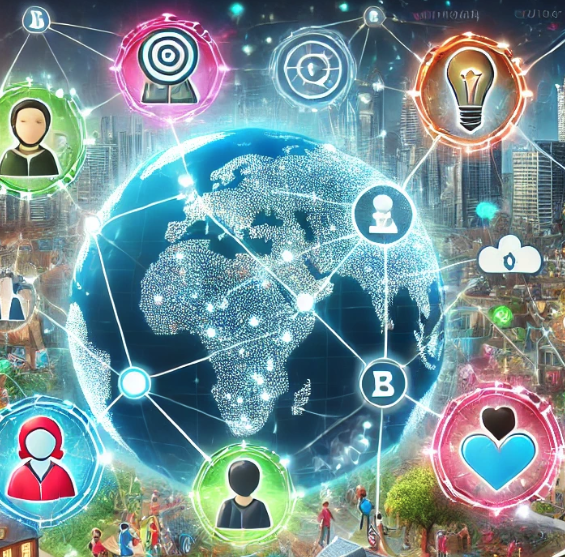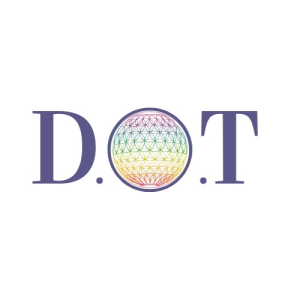Development Over Time Admin
Blog entry by Development Over Time Admin

Author: Clarissa Terracciano
Date: October 8, 2024
Category: Education Technology, Blockchain, AI in Education
Blockchain for Lifelong Learning Globally
Blockchain technology has come a long way from its cryptocurrency origins and has begun to redefine sectors far beyond finance, one of the most promising being education. In the 21st century, learning has expanded beyond traditional classrooms and age limitations. Lifelong learning has become essential as skills and industries evolve faster than ever. Blockchain technology, with its decentralized and secure infrastructure, offers a solution that can revolutionize how learners access, store, and share educational credentials across the globe, fostering lifelong learning on an unprecedented scale.
Why Lifelong Learning Matters
In today’s rapidly evolving world, staying stagnant in one's knowledge and skills is not an option. Whether you are a student, professional, or retiree, the need to adapt to new technologies, methodologies, and information is constant. Lifelong learning is about empowering individuals to continuously engage with education throughout their lives, equipping them with the tools they need to thrive in an ever-changing global landscape. Blockchain’s unique capacity for transparency, security, and global access directly supports this mission, transforming how credentials are stored, shared, and authenticated.
As highlighted by Fleener (2022), blockchain enables a secure, decentralized method of documenting significant life experiences and competencies, which can shift the focus from traditional academic achievements to a more comprehensive view of lifelong learning (p. 42). With the increased accessibility and security of educational records through blockchain, we can eliminate geographical, economic, and institutional barriers that have historically limited access to education.
Blockchain and Credentialing: A Global Lifeline
One of the most compelling applications of blockchain in education is the secure management and verification of academic credentials. In a world where academic fraud and the cumbersome process of credential verification create barriers, blockchain offers a solution that is both tamper-proof and accessible globally. According to Steiu (2020), blockchain provides a secure platform where educational credentials can be verified and stored immutably, increasing trust among institutions, employers, and learners (p. 75).
This enhanced trust is particularly valuable for lifelong learners, who may engage in multiple educational experiences across their lifespan, from traditional degree programs to informal online courses. Blockchain allows for these diverse learning experiences to be recorded, verified, and shared with ease, ensuring that all learning, regardless of format or location, can be recognized and valued.
Empowering Learners Through Data Ownership
Traditionally, institutions have maintained control over learners’ credentials, meaning individuals had to request their academic records through often slow, expensive processes. Blockchain changes this dynamic by giving learners ownership of their data. According to Ocheja et al. (2023), blockchain systems allow individuals to maintain a secure, verifiable record of all educational achievements throughout their life, enabling a lifelong learning ecosystem where the learner is in control (p. 1081). This self-sovereign model of credentialing empowers learners by giving them the ability to share their academic records directly with employers or other institutions, without intermediaries, delays, or fees.
Challenges and the Path Forward
While blockchain presents immense potential, there are still challenges to overcome. Fleener (2022) and Williams (2019) emphasize that blockchain technology in education remains largely experimental, with scalability issues and infrastructural changes needed within educational institutions (p. 26). The shift towards decentralized credentialing requires significant collaboration across the education sector and beyond, with the need for policies and standards that support the interoperability of blockchain platforms.
Tan et al. (2021) address these challenges by proposing governance frameworks for blockchain adoption in the public sector, stressing the need for collaboration between policymakers, educators, and technologists to ensure successful implementation (p. 21). Despite these hurdles, the momentum is growing, and the potential of blockchain to revolutionize education globally is becoming more widely recognized.
A Future Built on Decentralized Learning
As blockchain continues to mature, its application in education will only expand. The decentralized nature of blockchain allows it to be a vehicle for educational equity and access. Sutikno and Aisyahrani (2023) argue that blockchain can democratize access to education records, providing global learners with equal opportunities to engage with education systems and share their achievements (p. 12).
The future of lifelong learning is decentralized, transparent, and secure—powered by blockchain. As we continue to push the boundaries of how education is delivered, verified, and shared, blockchain will be a critical catalyst in ensuring that learners worldwide have access to the tools they need for lifelong growth and success.
Call to Action:
Are you an educator, administrator, or policymaker interested in how blockchain can support lifelong learning? Now is the time to explore how blockchain technology can be integrated into your institution's systems. Let's work together to create a future where learning is lifelong, accessible, and secure for everyone. Follow our blog for the latest on blockchain innovations in education, and share your thoughts in the comments or on social media.
Tags: Blockchain technology, Lifelong learning, Academic credentialing, Digital education, Global access, Decentralized education, Secure learning records, Education equity, Credential verification, Education policy innovation.
About the author:
Clarissa Terracciano is an experienced educator, educational consultant, and researcher specializing in blockchain technology and its transformative impact on education. Clarissa holds a BA in Psychology from CUNY Hunter College, an MA in Inclusive and Special Education from Teachers College, Columbia University, and is currently completing her PhD in Educational Leadership and Policy Studies at the University of Denver. She is committed to advancing equitable access to education through technology-driven approaches.
References
Fleener, M. J. (2022). Blockchain Technologies: A Study of the Future of Education. Journal of Higher Education Theory and Practice, 22(1), 26-42.
Ocheja, P., Flanagan, B., Ogata, H., & Oyelere, S. S. (2023). Visualization of education blockchain data: Trends and challenges. Interactive Learning Environments, 31(9), 5970–5994. https://doi.org/10.1080/10494820.2022.2026406
Steiu, M.-F. (2020). Blockchain in Education – Opportunities, Applications, and Challenges. First Monday, 25(9). https://doi.org/10.5210/fm.v25i9.10654
Sutikno, T., & Aisyahrani, A. I. B. (2023). Non-Fungible Tokens, Decentralized Autonomous Organizations, Web 3.0, and the Metaverse in Education: From University to Metaversity. Journal of Education and Learning, 17(1), 1-15. https://doi.org/10.11591/edulearn.v17i1.20657
Tan, Y., Mahula, J., & Crompvoets, J. (2021). Blockchain governance in public sector: An evaluation model. Journal of Information Technology, 36(1), 1-22.
Williams, P. (2019). Does competency-based education with blockchain signal a new mission for universities? Journal of Higher Education Policy and Management, 41(1), 104-117. https://doi.org/10.1080/1360080X.2018.1520491
